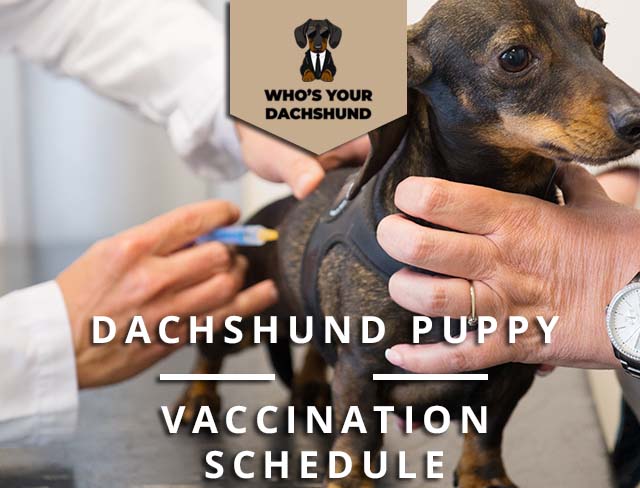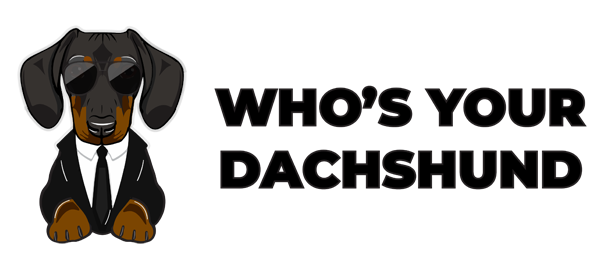
The Dachshund puppy vaccination schedule is an integral part of your pet’s care. Vaccinations help protect your pup from several diseases, and the earlier these are administered, the more effective they are. The dachshund puppy vaccination schedule is for a pet that has all of its shots up to the age of 14 weeks, at which time it should have a follow-up vaccine dose.
The Dachshund puppy vaccination schedule is as follows:
7-10 days: Distemper, Hepatitis, and Parainfluenza (DHLPP)
It protects your pup from distemper, hepatitis, and parainfluenza.
10-14 days: Bordetella
It protects your pet from kennel cough. It is also a combination vaccine.
14-16 weeks: Rabies
It protects your pet from rabies. This vaccine can be given earlier; however, it needs to be given before the end of the 14th week to protect your pet. It is best to have your pet vaccinated before it leaves the breeder and before it turns four months of age, this vaccine can still be given after the 14th week.
Dog Vaccinations
Dog vaccinations are a necessity. Before you get your cute puppy vaccinated, it is vital to know the type of vaccine your dog needs and why they are needed. Whether your dog will be boarding at a kennel or spending time in a pet daycare, they are at risk of being exposed to other dogs. Dog vaccinations are designed to prevent certain diseases from spreading. These vaccinations can be administered as early as seven weeks of age, with follow-up shots at regular intervals afterward. As your dog gets older, they will require additional shots to keep them healthy and prevent them from acquiring new diseases.
What Is Dog Vaccine Therapy and Why Is It Important?
Dogs are susceptible to many diseases, parasites, and other health risks. Vaccination is a way to help prevent your pet from getting sick.
Rabies
There is a viral disease called rabies that causes severe brain inflammation. It is transmitted through an infected animal’s saliva, often through a bite. The primary infection route for dogs is biting or scratching, followed by contact with saliva on mucous membranes or an open wound. Once symptoms begin to appear, rabies is almost always fatal. Preventive vaccination, administered before symptoms, will save your pet’s life.
Distemper
It is a viral disease that causes inflammation of the nose and throat. It can also cause severe damage to the brain, spinal cord, and kidneys. Distemper has a high mortality rate in puppies if it is not treated early on and can be transmitted through airborne contact with an infected dog or its bodily fluids.
Parvovirus
Parvovirus is one of the most severe diseases that affect puppies. It is highly contagious and spreads through droplets of saliva and infected feces. Parvovirus attacks the gastrointestinal tract, causing bloody diarrhea and vomiting. If your puppy is not vaccinated against the disease, they will likely come down with it.
Canine Influenza
Canine influenza (CIV) can spread quickly within a pack of dogs but is not transferable to humans or other pets. Symptoms include running nose, cough, lethargy, and sometimes fever and gastrointestinal symptoms such as vomiting. Canine influenza vaccine will help your dog build up immunity to the disease, so they do not fall ill from the infection.
Leptospirosis
This bacterial disease occurs most often in warm and wet areas, such as the tropics and the Southern US. Leptospirosis can be transmitted to humans through contact with infected urine or soil. Canine leptospirosis is rarely fatal but can cause liver damage and other complications if left untreated. A vaccine will help your dog build up immunity over time, so they do not contract the disease.
Lyme Disease
Lyme disease is transmitted through ticks and causes fever, lack of appetite, lethargy, and joint pain in dogs. While it is not usually life-threatening when treated early on, it can become life-threatening within days if left untreated. The canine Lyme disease vaccine will help guard against the disease and prevent it from happening in your pet.
What Are The Core Dog Vaccinations?
There are a few core vaccines that any dog needs to have. These include Rabies, Canine Parvovirus, Canine Distemper, and Bordetella. Your veterinarian will recommend other vaccines based on your dog’s lifestyle and risk factors.
Are There Optional Dog Vaccines?
The answer is no. There are no optional dog vaccines, so both you and your pet should be vaccinated. Ensure you get fully up-to-date with all vaccinations because each year, a new vaccine is being developed. Many vaccines, such as rabies and canine hepatitis, are recommended annually.
Are you getting ready to go home with your new puppy? Think about taking care of him before he comes home and then making sure he stays healthy! The first thing you want to know is if your pup will need any vaccinations or if he has had all of his shots. Your veterinarian has given your pet a set of three core vaccines for protection against many common health concerns. A state may require this protection level as a minimum under state law. Now it is up to you to protect your puppy from other diseases.
Many dogs in the United States have not been vaccinated against rabies, which can be fatal. A dog owner should also know all the dangers of rabies and why it’s important to vaccinate their dog. The following are some tips for how to prepare your puppy for coming home:
- Visit the veterinarian.
- Get your puppy used to being handled and examined by a veterinarian.
- Learn about the fundamental health care for a dog, such as neutering and de-clawing (if you plan on doing so).
- Discuss vaccination schedules with your vet to know when your puppy will be ready for his shots.
- Find out what your puppy’s diet should be like and discuss any supplements you should give him during his first year of life.
5 Tips For Keeping Your Pet Healthy
Keep vaccinations current
Most veterinarians recommend a series of four core vaccines are given between ages six weeks and 16 weeks, called a puppy vaccination series. This series will protect from distemper, parvovirus, hepatitis, and canine influenza. If the vaccines have been completed by 16 weeks of age, then the next vaccine is not needed for another year. A minimum of rabies vaccinations is required every three years. Your veterinarian will recommend other vaccines based on your dog’s lifestyle and risk factors.
Keep your pet current on heartworm prevention.
Heartworm disease is a severe illness for dogs transmitted through mosquitoes that can cause life-threatening heart murmur and damage to blood vessels throughout the body in dogs not yet diagnosed with this disease. You can prevent heartworm disease in all dogs by administering monthly preventative medications year-round.
Keep fleas and ticks at bay.
Fleas and ticks can irritate your pet and family members and transmit tapeworms. Both are easily treated with prescription medications. Your veterinarian will recommend the best parasite prevention program for your pet based on its lifestyle, geographical location, risk factors, and other medical conditions.
Keep nails trimmed
Long nails can cause pressure or pain on your pet’s paws, as well as tearing of the nail that leads to infection. Long nails can be trimmed at home with a clipping device from your veterinarian or found in most pet supply stores.
Vaccinate against kennel cough
Kennel cough is a highly contagious respiratory disease spread by contact with infected dogs in areas where it is expected. Your veterinarian will recommend vaccines based on your dog’s lifestyle and risk factors.
When To Start Puppy Vaccinations
“Puppies should be immunized between 6 and 8 weeks and again 3 to 4 weeks later with a vaccine recommended for puppies. An initial vaccine is usually followed by a booster at one year of age, with revaccination every three years after that. Your veterinarian will determine the frequency of your puppy’s vaccinations based on lifestyle and risk factors.”
Follow your veterinarian’s advice. He or she will schedule an appointment based on your dog’s lifestyle. Please bring your puppy to the veterinarian for a complete check-up if you are uncertain whether it has received vaccinations.
Puppy Shots: How Often Are They Given?
The frequency of puppy shots will depend on what is recommended by your dog’s veterinarian. The initial series of puppy shots is typically completed between 6 and 8 weeks of age, depending on the type of vaccine administered. Your dog’s veterinarian will determine the puppy vaccination schedule and frequency for follow-up shots. It is possible to vaccinate dogs earlier, but the vaccines are typically not effective until the recommended minimum age.
Do’s And Dont’s After Puppy Vaccination
- The puppy must be indoors for three days following vaccination, but five days is preferable so that they receive complete protection from the vaccine.
- Puppies should not be allowed to play until their white blood cell count (WBC) is back to normal.
- Puppies may be allowed out of the cage for a short time if they are on medication or after treating any underlying health issue, but keep in mind that they are still very young, and nothing is 100%.
- After receiving the vaccination, don’t leave your pup alone for longer than three hours.
- After ten days, if the pup shows any sign of illness such as fever, cough, or diarrhea, it probably needs to be revaccinated again and kept indoor for another 7-10 days.
- Don’t hesitate to see your vet if you see any sign of illness in your dog, whether or not he had been vaccinated.
The Duration Of Each Vaccination Is As Follows:
- Rabies: 1 Year
- Distemper: 2 Years
- Parvo: 2 Years
- Hepatitis: 3 Years
- Leptospirosis: 6 Months
- Canine Parvovirus: 13 Weeks
- Leptospira Pulmonalis (Lepto): 6 Months
Reasons Why Puppies May Not Have Received Their Vaccination.
- It was the wrong day of the month for him to get it.
- He got injured and was unable or not allowed to receive his vaccine.
- The area from his neck down to his tail received the vaccine but not the area above him.
- He may have received the wrong injection or the machine which provided his vaccine broke down.
- His teeth were severely moderated, making it impossible for him to receive the vaccination.
- He had trouble swallowing or breathing in the syringe due to impaired breathing or throat infection called tracheobronchitis (TB), which caused an insufficient blood supply in his lungs.
- He received too little of the vaccine being administered too slowly.
- After a month of life, he was vaccinated, and the antibody levels were low.
- His mother had been vaccinated as an adult and passed this immunity on to him at birth.
- The vaccination was given incorrectly in that he was given a different vaccine from what he needs and is not traveling to a country where he needs this vaccination.
Dog Vaccinations: Risks and Side Effects
Dog vaccinations may cause minor or severe side effects, but these are generally rare.
- The risk of shedding the virus to others is higher in dogs that have been vaccinated.
- The risk of side effects from the vaccines is low but possible, and more familiar with parvovirus vaccination (especially if done at a late age).
- There is a slight risk of vaccine site infection in all vaccination sites, especially Parvo, Canine Distemper, and canine parvovirus (CvP); Usually small red bumps on site (no pain).
- There’s a slight risk of Vaccinia or Bacillus Calmette-Guerin (BCG) vaccination site ulcers with ruffled hair coat.
- All vaccines may cause harmless anaphylactic reactions or stiffness/collapse in the form of tetanus.
- High dose vaccinations (including Rabies and Feline Panleukopenia, Adenel Karbohidratosis) may lead to nervous system symptoms, including tremors, shivering/paralysis, and pain in limbs or head.
- An allergic reaction is probable; however, the reaction is rare and usually mild, including skin rashes in response.
The most reliable way to prevent side effects is to keep your dog inside and away from public areas for at least seven days after vaccination.

